Washington Water Main, March 22: Infrastructure Bill and Interior Secretary Nomination Moving Quickly to Senate Floor
This week, committees within the Senate passed a $US 20 billion water-infrastructure bill and approved Sally Jewell’s candidacy for Interior Secretary. The next step for both will be a vote on the Senate floor.

A major bill guiding broad swaths of infrastructure work across the United States will be presented for a vote in Congress for the first time in six years.
On Wednesday, the Senate Environment and Public Works Committee passed the Water Resources Development Act (WRDA) to the Senate floor. The 284-page bill guides general decisionmaking and authorizes — but does not actually fund — roughly $US 20 billion to the U.S. Army Corps of Engineers for water-resources projects including flood prevention, river and harbor management, and ecosystem restoration.
“A lot of people don’t recognize the role that the Army Corps of Engineers has in major water infrastructure in this country,” said Mark Smith, deputy director of The Nature Conservancy’s North American freshwater program.
WRDA, as a water-infrastructure bill with national scope, affects several of the most pressing water-related issues facing the United States. Since Superstorm Sandy racked up tens of billions of dollars in damages for eastern states last year, lawmakers have focused on flood control and other extreme weather damage-prevention measures in public speeches and policy planning. Consequently, this bill features a section called “extreme weather,” which authorizes $US 250 million annually for Army Corps storm-mitigation work. WRDA also calls for the National Academy of Sciences to study ways to reduce damage from extreme weather events.
The bill does not, however, mention climate change, The Hill reported.
The bill, in some way, addresses every single one of the issues [except one] related to the topics we’ve been advocating for
–Mark Smith
The Nature Conservancy
Climate change is a politically divisive issue that could jeopardize WRDA’s historically bipartisan support. The act was first introduced in 1974. It is supposed to be amended every two years, but this is the first version introduced since 2007. Barbara Boxer (D-California), chair of the Environment committee, and ranking member Senator David Vitter (R-Louisiana) co-introduced this version of the bill.
Other issues addressed in WRDA include:
- A three-year cap on the Army Corps’ permitting process, which has generated some pushback from environmental groups.
- New ways for local governments to fund infrastructure projects, including incentives for private-sector involvement and a pilot $US 50 million annual program to state and local government water-supply, wastewater, and flood-control projects.
- Reforms to the Harbor Maintenance Trust Fund, which helps pay for port repair.
Smith told Circle of Blue that The Nature Conservancy is still reviewing the bill — as it was introduced and passed quickly through committee within the week — but he is encouraged at this early stage.
“The bill, in some way, addresses every single one of the issues [except one] related to the topics we’ve been advocating for,” Smith said. “That doesn’t mean they did everything we wanted.”
Smith was happy to see a section in the bill that draws on an ongoing partnership between The Nature Conservancy and the Army Corps. The collaboration focuses on proactive planning to minimize the environmental damage caused by Corps civil-works projects.
In the bill’s broader language, Smith sees a common desire from the nonprofit world, Congress, and the Corps itself to make water infrastructure development faster and more holistic — considering what is best for the environment and local economies in both the short and long term.
A vote is expected in April or May, FedWatch reported.
Jewell Nomination to Senate Floor
Also on Wednesday, Sally Jewell moved one step closer to replacing Ken Salazar as Interior Department Secretary. The Senate Energy and Natural Resources Committee approved Jewell’s nomination by a 19-3 vote, all but assuring that the current chief executive of Recreational Equipment Inc. will be confirmed.

If confirmed, Jewell will take over a department with a $US 1 billion budget and a major role in guiding U.S. conservation, water management, and energy production.
The Interior Department, which manages and protects one-fifth of total U.S. landmass, launched a nationwide water-conservation plan called WaterSMART in 2010. But ongoing drought conditions in more than half the continental United States will threaten water systems of all kinds that are already strained by mismanagement, overuse, urbanization, and more.
A set of rules for hydraulic fracturing on public lands will also be near the top of the new Interior Secretary’s energy agenda, as the country awaits a 2014 Environmental Protection Agency report on fracking’s effect on drinking water. The Interior Department will also consider regulations for on- and off-shore natural gas development.
Several Senators have leveraged the nomination process to advance Interior-regulated projects in their home states.
Most notable among Jewell’s supporters was Senator Lisa Murkowski (R–Alaska), the committee’s ranking minority member. However, Murkowski had originally threatened to block Jewell’s nomination unless the Interior Department approved a small road connecting the remote town of King Cove to an airport through the Izembek National Wildlife Refuge.
–Senator Lisa Murkowski
(R-Alaska)
Murkowski changed her mind this week and voted for Jewell after current Secretary Salazar — who met with King Cove residents earlier this month — agreed to reassess the decision last Thursday, The Los Angeles Times reported. He also agreed to pass any unfinished work related to King Cove along to Jewell.
“We all have our King Coves. We all have a situation when we’re working with — or sometimes against — our Federal agencies and feel like we’re not being heard,” Murkowski said during the hearing on Thursday. “Sometimes we need to press a little bit harder to ensure the interests of our constituents are addressed.”
Joining Murkowski in fighting for home-state issues were Senators Joe Manchin (D-West Virginia.) and James Risch (R-Idaho).
Manchin is especially concerned about how the Interior Department’s mining-regulation bureau will legislate water-quality protections around mountaintop-removal mining in his state. He still approved Jewell’s nomination, and committee chairman Ron Wyden (D-Oregon) promised the committee’s attention to the issue this session.
Risch also supported Jewell, but with a caveat: Risch and other Western lawmakers, The New York Times reported, want to avoid listing the sage grouse, a prairie bird, under the Endangered Species Act. They believe such a move would unnecessarily block commercial and agricultural development on hundreds of thousands of acres of public lands. Risch said he would hold up Jewell’s Senate vote if the birds’ status changed.
The three votes against Jewell’s nomination came from Mike Lee (R-Utah), Tim Scott (R-South Carolina), and John Barrasso (R-Wyoming).
Barrasso has been most vocal in his opposition to Jewell, believing her board membership on the National Parks Conservation Alliance presents a conflict of interest. When Barrasso pressed Jewell on the issue during her confirmation hearing, she said that she saw no conflict of interest and would continue to follow all necessary ethics review procedures. Notably, Barrasso also struck a confrontational tone during that hearing on questions about human activity’s contributions to climate change.
A full Senate vote on Jewell’s nomination is expected soon after the Passover/Easter recess, an aide for Senate majority leader Harry Reid told The New York Times.
Sources: Department of The Interior, Governing, The Hill, The Los Angeles Times, The New York Times Green Blog, The New York Times
is a Washington, D.C–based correspondent for Circle of Blue. He graduated from DePauw University as a Media Fellow with a B.A. in Conflict Studies. He co-writes The Stream, a daily summary of global water news.

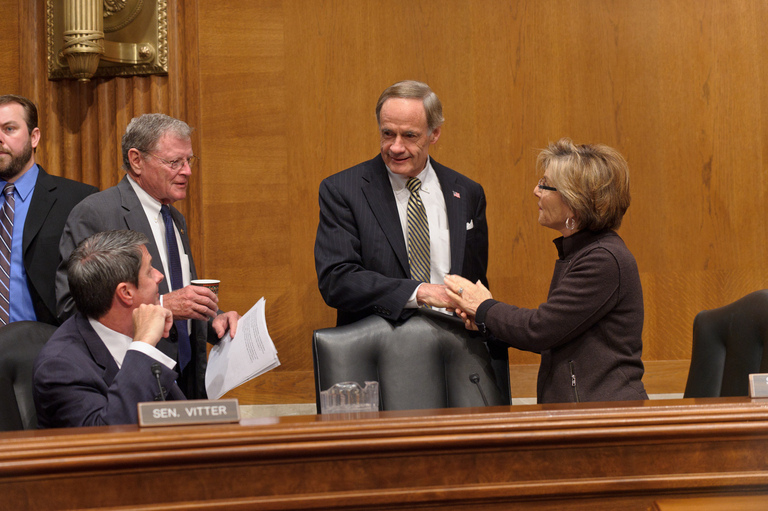
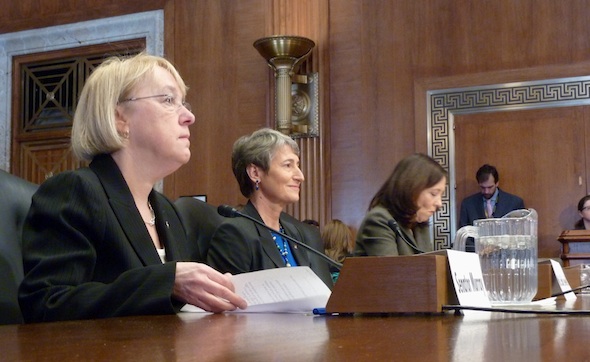
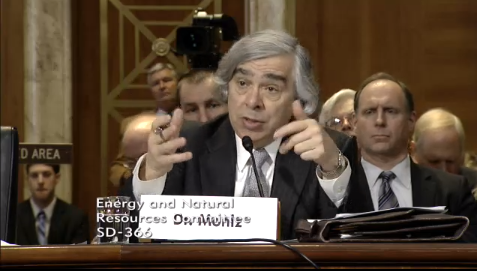
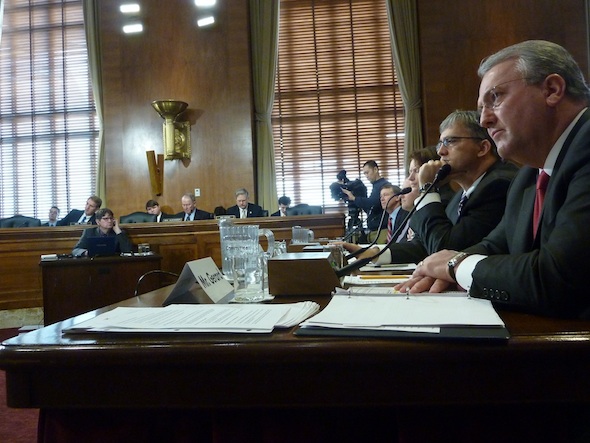
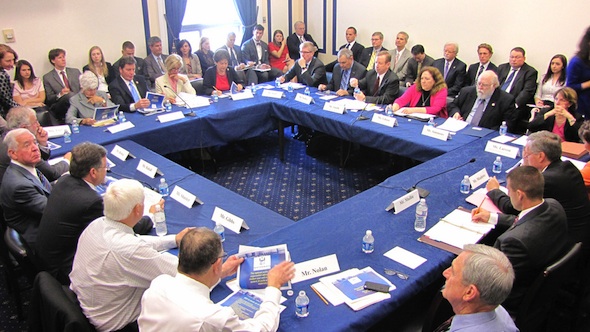

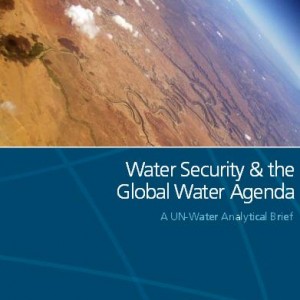
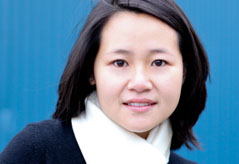
Leave a Reply
Want to join the discussion?Feel free to contribute!